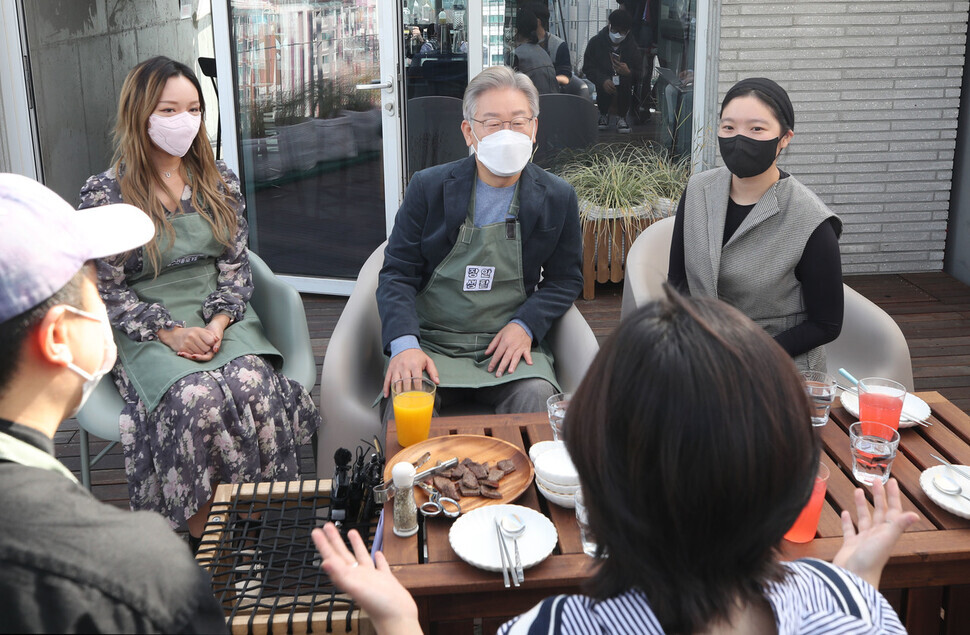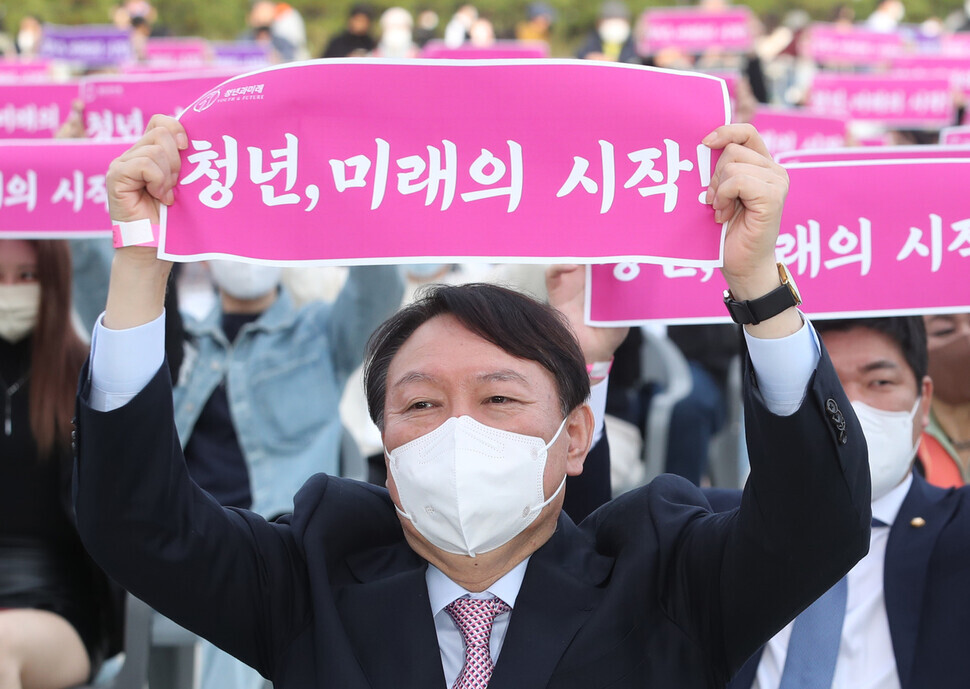hankyoreh
Links to other country sites 다른 나라 사이트 링크
Presidential nominees Yoon and Lee set sights on wary young voters

This was the first weekend since South Korea’s two biggest parties nominated their candidates for next spring’s presidential election. The topics being hammered home by both candidates — Lee Jae-myung, with the ruling Democratic Party, and Yoon Seok-youl, with the People Power Party — are jobs and housing for people in their 20s and 30s. Young voters are a critical part of a winning coalition, and both Lee and Yoon need to make up ground with them.
“If populism is what’s needed to save young people who have lost all hope, I’ll happily resort to populism,” Lee wrote on Facebook on Sunday. He expressed his determination to tackle the problems facing Korea’s youth while referencing the story of a 22-year-old who was charged with parricide after his father died while in his care following a brain hemorrhage.
One day earlier, on Saturday, Lee paid a visit to a shared housing unit for young people in the Dongdaemun District of Seoul. “I plan to provide public housing on a normally unimaginable scale. That housing will be distributed on a priority basis to young people, the most vulnerable group in our society, as part of my vision of helping the weak and checking the powerful,” he remarked.
On Saturday, the day after he clinched the PPP’s nomination, Yoon sat down for lunch with Lee Jun-seok, leader of the PPP. After the primary, young party members who had supported Yoon’s main rival, Hong Joon-pyo, left the party to protest the primary’s domination by older voters. Yoon’s meeting with Lee Jun-seok, who has sway with young men in their 20s and 30s, seemed to be an attempt to stop the hemorrhaging of young voters.
Following this, Yoon attended an event for Korean Youth Day at Olympic Park in Seoul’s Songpa District on Sunday. “Prior to being a presidential candidate, I’m a member of the older generation — and for that, I really owe you all an apology,” he said.
“I will create jobs to which you can enthusiastically dedicate your youth and will provide full support to corporations. I will build homes where you can unwind so you can focus on your work and studies without worrying about housing.”
Lee and Yoon are racing to win the youth vote partly because a large number are swing voters who haven’t made up their minds, and partly because neither candidate has definitely won them over.
When Gallup Korea asked 1,000 adults around the country on Nov. 2-4 who they wanted to be the next president, Hong came in first, with 24%, followed by Lee, at 20%, among people aged 18 to 29. The poll had a confidence level of 95% and a sampling error of plus or minus 3.1 points. Among people in their 30s, Lee was at 29%, and Hong was at 19%.
Only 3% of people in their 20s and 7% of people in their 30s chose Yoon. That leaves him with the challenge of winning over the young voters who had been hoping to vote for Hong.

Lee’s standing with this age group may be stronger than Yoon’s, but young people’s antipathy for the current administration’s real estate and job policies makes him just as anxious to court their votes. Bringing them back around is particularly urgent since they’ve constituted a major part of the Democratic Party’s base in past presidential elections.
For Yoon, the challenge is to surmount the substantial favorability gap.
As the two parties vie for the youth vote, party leaders are competing to curry their favor. During the Korean Youth Day event that Yoon attended on Saturday, Lee Jun-seok promised the People Power Party would adjust the minimum age for running for the National Assembly and in local elections so that people would become eligible to vote and to run in elections at the same age.
Lee’s surprise proposal to lower the age requirement for running for office from the current age of 25 to 18 was accepted by Democratic Party leader Song Young-gil, who was also at the event. But the Democratic Party hurried to reframe the narrative so that it wouldn’t look as if the PPP was setting the pace on lowering the age requirement. “I welcome the idea, and I truly hope the promise will be kept,” Song wrote on Facebook on Sunday.
“But I’m doubtful whether my agreement with Lee will be supported by conservative lawmakers in the PPP such as floor leader Kim Gi-hyeon,” Song said.
Song added that he hoped “the pledge to lower the age requirement for running for office won’t prove to be an empty gesture at a youth meeting,” while emphasizing that it was the Democratic Party that had first proposed allowing Koreans overseas to mail in their ballots.
By stressing the sincerity of its youth policy, the Democratic Party seems intent on not losing the initiative in that area.
“People in their 20s and 30s are part of a generation that’s strongly post-ideological and post-regional in an electoral system that’s bifurcated between conservatives and progressives and between the Yeongnam region in the southeast and the Honam region in the southwest. Whoever wins their vote is bound to gain the lead in the election,” said Park Sang-byeong, a visiting professor at Inha University.
By Shim Wu-sam and Oh Yeon-seo, staff reporter
Please direct questions or comments to [english@hani.co.kr]

Editorial・opinion
![[Column] Season 2 of special prosecutor probe may be coming to Korea soon [Column] Season 2 of special prosecutor probe may be coming to Korea soon](https://flexible.img.hani.co.kr/flexible/normal/500/300/imgdb/original/2024/0426/3317141030699447.jpg) [Column] Season 2 of special prosecutor probe may be coming to Korea soon
[Column] Season 2 of special prosecutor probe may be coming to Korea soon![[Column] Park Geun-hye déjà vu in Yoon Suk-yeol [Column] Park Geun-hye déjà vu in Yoon Suk-yeol](https://flexible.img.hani.co.kr/flexible/normal/500/300/imgdb/original/2024/0424/651713945113788.jpg) [Column] Park Geun-hye déjà vu in Yoon Suk-yeol
[Column] Park Geun-hye déjà vu in Yoon Suk-yeol- [Editorial] New weight of N. Korea’s nuclear threats makes dialogue all the more urgent
- [Guest essay] The real reason Korea’s new right wants to dub Rhee a founding father
- [Column] ‘Choson’: Is it time we start referring to N. Korea in its own terms?
- [Editorial] Japan’s rewriting of history with Korea has gone too far
- [Column] The president’s questionable capacity for dialogue
- [Column] Are chaebol firms just pizza pies for families to divvy up as they please?
- [Column] Has Korea, too, crossed the Rubicon on China?
- [Correspondent’s column] In Japan’s alliance with US, echoes of its past alliances with UK
Most viewed articles
- 1‘We must say no’: Seoul defense chief on Korean, USFK involvement in hypothetical Taiwan crisis
- 2Why Kim Jong-un is scrapping the term ‘Day of the Sun’ and toning down fanfare for predecessors
- 3Two factors that’ll decide if Korea’s economy keeps on its upward trend
- 4BTS says it wants to continue to “speak out against anti-Asian hate”
- 5After election rout, Yoon’s left with 3 choices for dealing with the opposition
- 6Gangnam murderer says he killed “because women have always ignored me”
- 7South Korea officially an aged society just 17 years after becoming aging society
- 8AI is catching up with humans at a ‘shocking’ rate
- 9Ethnic Koreans in Japan's Utoro village wait for Seoul's help
- 1046% of cases of violence against women in Korea perpetrated by intimate partner, study finds